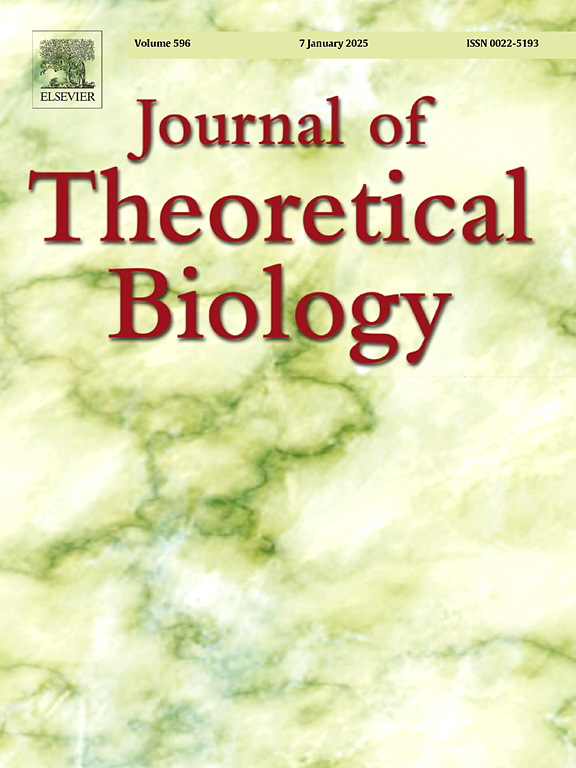复制因子动力学中策略依赖时滞的隔室模型。
IF 1.9
4区 数学
Q2 BIOLOGY
引用次数: 0
摘要
现实世界的过程经常表现出动作和反应之间的时间分离——这是许多建模框架经常忽略的一个特征。添加时间方面,如时间延迟,会引入更高的问题复杂性,并导致分析具有挑战性的模型和计算成本高昂的模型。在这项工作中,我们提出了一个在进化博弈论框架下解决这个问题的中间解决方案。我们基于隔间的模型包括了时间延迟,但分析起来相对简单直接。我们表明,该模型与包含显式延迟的模型在质量上可比较。特别地,我们关注父母的互动和后代加入群体之间的延迟的情况,延迟的大小取决于父母的策略。我们分析了猎鹿游戏、雪堆游戏和囚徒困境游戏,并表明依赖于策略的延迟对受影响的策略是有害的。此外,我们介绍了包括延迟如何改变人群中有效的博弈,随后强调了考虑所研究系统的时间方面以准确建模的重要性。本文章由计算机程序翻译,如有差异,请以英文原文为准。
Compartment model of strategy-dependent time delays in replicator dynamics
Real-world processes often exhibit temporal separation between actions and reactions - a characteristic frequently ignored in many modelling frameworks. Adding temporal aspects, like time delays, introduces a higher complexity of problems and leads to models that are challenging to analyse and computationally expensive to solve. In this work, we propose an intermediate solution to resolve the issue in the framework of evolutionary game theory. Our compartment-based model includes time delays while remaining relatively simple and straightforward to analyse. We show that this model yields qualitatively comparable results with models incorporating explicit delays. Particularly, we focus on the case of delays between parents’ interaction and an offspring joining the population, with the magnitude of the delay depending on the parents’ strategy. We analyse Stag-Hunt, Snowdrift, and the Prisoner’s Dilemma game and show that strategy-dependent delays are detrimental to affected strategies. Additionally, we present how including delays may change the effective games played in the population, subsequently emphasising the importance of considering the studied systems’ temporal aspects to model them accurately.
求助全文
通过发布文献求助,成功后即可免费获取论文全文。
去求助
来源期刊
CiteScore
4.20
自引率
5.00%
发文量
218
审稿时长
51 days
期刊介绍:
The Journal of Theoretical Biology is the leading forum for theoretical perspectives that give insight into biological processes. It covers a very wide range of topics and is of interest to biologists in many areas of research, including:
• Brain and Neuroscience
• Cancer Growth and Treatment
• Cell Biology
• Developmental Biology
• Ecology
• Evolution
• Immunology,
• Infectious and non-infectious Diseases,
• Mathematical, Computational, Biophysical and Statistical Modeling
• Microbiology, Molecular Biology, and Biochemistry
• Networks and Complex Systems
• Physiology
• Pharmacodynamics
• Animal Behavior and Game Theory
Acceptable papers are those that bear significant importance on the biology per se being presented, and not on the mathematical analysis. Papers that include some data or experimental material bearing on theory will be considered, including those that contain comparative study, statistical data analysis, mathematical proof, computer simulations, experiments, field observations, or even philosophical arguments, which are all methods to support or reject theoretical ideas. However, there should be a concerted effort to make papers intelligible to biologists in the chosen field.

 求助内容:
求助内容: 应助结果提醒方式:
应助结果提醒方式:


